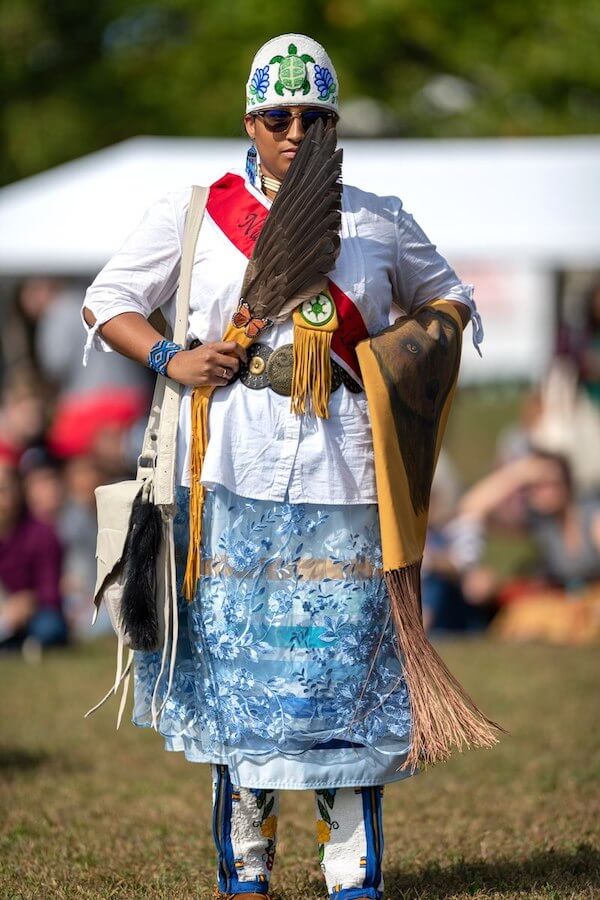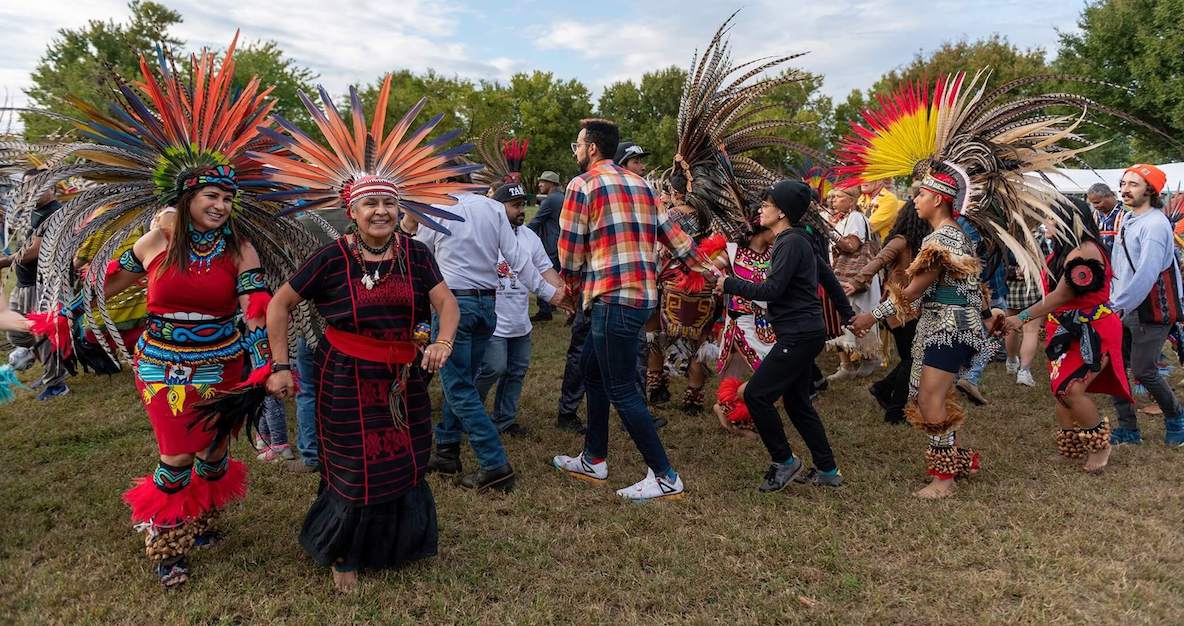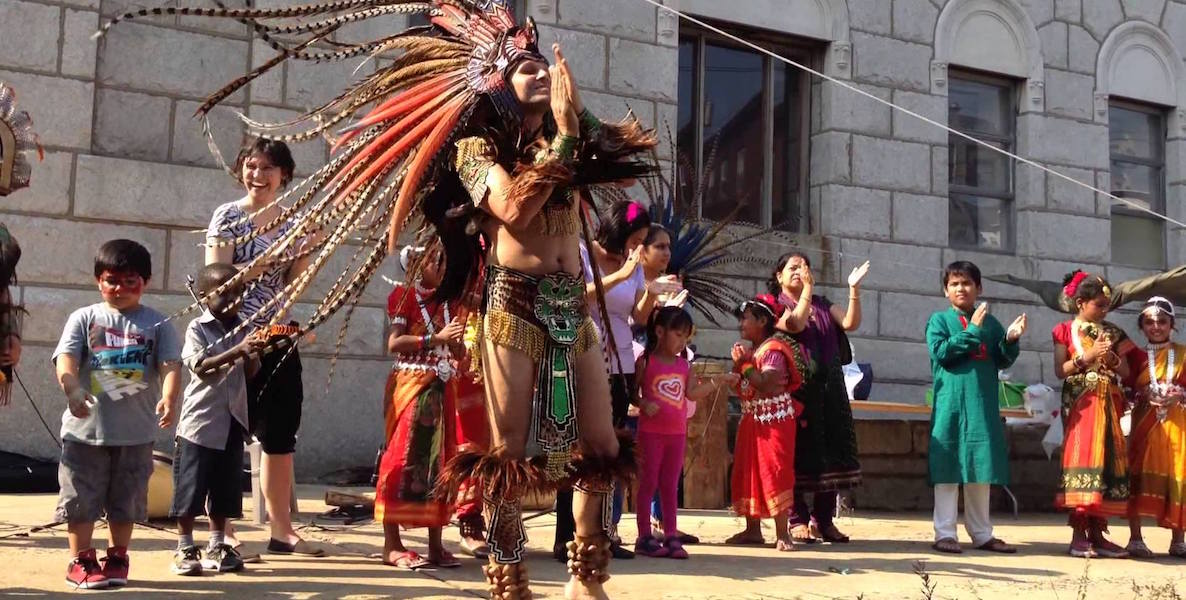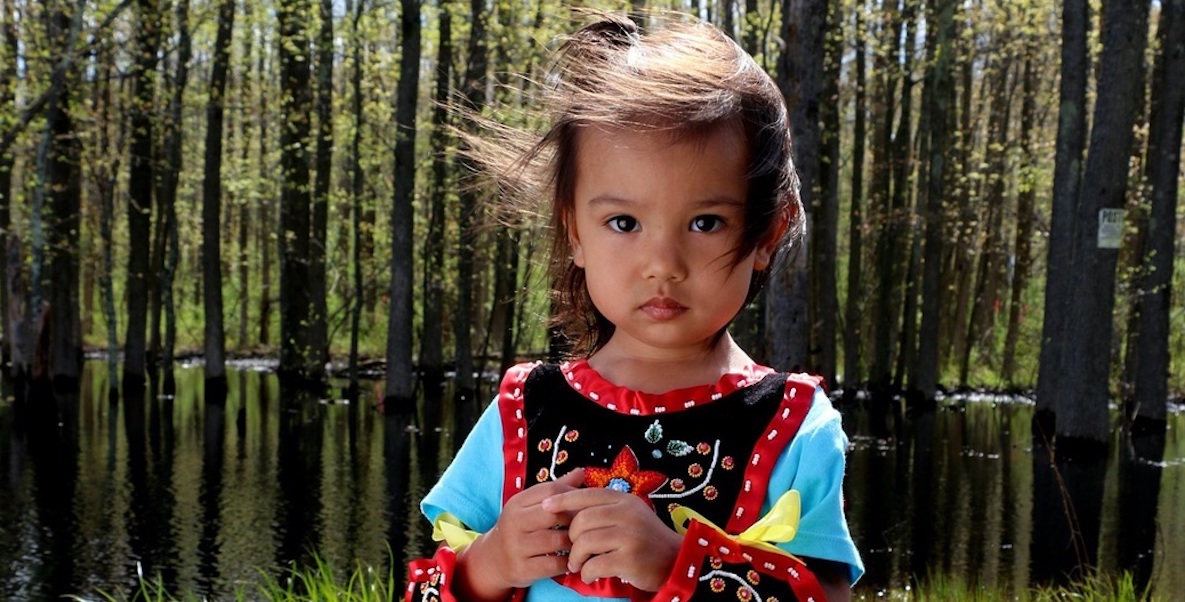When Trinity Norwood was in sixth grade, her home economics teacher asked the class to bring a traditional family dish to share. She brought corn pudding, a sweet corn custard she grew up making with her great aunt—a part of her Lenape culture.
“The children who were sitting at the table with me, told me that they didn’t believe I was native,” she says, “I had to be some ‘negro Egyptian thing.‘”
Norwood grew up in Moorestown, New Jersey, about an hour and a half away from her Nanticoke Lenni-Lenape tribal community headquarters in Bridgeton. Often she was the sole native student in the classroom, immersed in an education system that largely refers to Native Americans in the past tense. The reaction of her classmates wasn’t all that surprising, though no less upsetting.
“It was a confusing experience that I did not recognize at the time as traumatic,” says Norwood. “But from that point on, I did whatever I could do to just blend in at school, and I separated my Indigenous heritage and culture from my mainstream American life as a student.”

Norwood’s story is common among Indigenous young people, she says, who have to decide, “Am I going to have to fight every day, for my own humanity, because people are telling me I’m not who I am? Or is it easier to just be silent?”
And this, in part the result of the lack of comprehensive education about the history and present of our Indigenous people, contributes to their erasure.
Now, Norwood is actively working against that erasure. Though her non-profit Native New Jersey, she travels to area schools to provide education about the Indigenous people of our region. And she’s among the founding members of Indigenous Peoples’ Day Philly, which will hold its fourth annual event virtually October 10th and 12th.
Indigenous Peoples’ Day is about remembering (or, in many cases, learning for the first time) our pre-colonization history; relearning the history of the past 500 years from an Indigenous perspective; acknowledging and celebrating the surviving and thriving of the native people in our communities—and refuting the myths that still carry over about Columbus, despite what we know about his murderous history.
Though Columbus Day is still a nationally recognized holiday, at least 13 states and many cities have officially stopped celebrating the “explorer” and instead acknowledge our Indigenous history (North Dakota was the first in 1990). Here in Philadelphia, City Council passed a resolution designating the first Saturday of October Indigenous Peoples’ Day in 2011, but it’s not an official city holiday—which means most of us don’t even know about it.
City holidays are determined as a part of negotiations between the mayor and the four municipal unions. The next opportunity to change what we celebrate the second Monday in October is when the contracts are renegotiated at the end of this fiscal year next June. A union or member of Kenney’s administration would need to propose the switch and all parties would then need to agree.
In a city that takes so much pride in our history, shouldn’t we at least get it right? There are 67 National Historic Landmarks in Philadelphia and not a single one acknowledges an Indigenous leader or significant events related to Indigenous people. And the narratives of the places we do acknowledge tend to leave out the darker truths.
Take Shackamaxon, or Penn Treaty Park, where Indigenous Peoples’ Day was held the past two years. Maybe you’ve heard of the “peace treaty” made by Lenni Lenape Sachem Tamanend and William Penn in 1682—but what about before and after? Archaeological evidence suggests that people were living there 10,000 years ago. And from 4,000 years ago until just 500 years ago, Shackamaxon was a seasonal fishing village within Lenapehoking—Lenape land that stretched from eastern Pennsylvania to the west edge of Connecticut and from the Hudson Valley to the northern tip of Delaware—and a political center where leaders converged for council, negotiations and ceremonies.
“Am I going to have to fight every day, for my own humanity, because people are telling me I’m not who I am? Or is it easier to just be silent?”
About 50 years after the supposed peace treaty, the Lenape were swindled out of their land in what’s known as the Walking Purchase. William Penn’s sons John and Thomas—who had already been selling land occupied by Lenape in the Lehigh Valley and needed to settle debts—presented Lenape chief Nutimus with a falsified document claiming that that the Munsee Indians (a Lenape sub-tribe that previously occupied the territory) had sold a tract of land.
The border would be determined by how far inland a person could walk in a day and a half from present-day Wrightstown. James Logan, William Penn’s secretary and land agent and later mayor (for whom our Logan Circle is named), proceeded with several accounts of foul play. He created an inaccurate map that underestimated the land likely to be walked in a day and a half to get Nutimus to sign; and he and the Penn brothers arranged to have paths cleared for their “walkers” who are said to have instead run, claiming about 70 miles. Then, anticipating the protests of the Lenapes, Logan arranged a deal with the Iroquois to prevent them from joining the Lenape in disputing the land grab.
Over the following centuries, the Lenape peoples were decimated by genocide, displaced by force and resettled across the U.S. and Canada. The Lenape diaspora includes federally recognized nations in Oklahoma and Wisconsin (Pennsylvania is one of 11 states that does not recognize a single tribe.)
You can learn more about the Walking Purchase and Lenape diaspora during Saturday’s panel, In Conversation: Lenape Peoples in Diaspora, Then and Now. You’ll hear from Curtis Zunigha, member and Cultural Director of the Delaware Tribe of Indians in Oklahoma and the co-founder of the Lenape Center in Manhattan; Heather Bruegl, an enrolled citizen of Oneida Nation of Wisconsin and the Director of Cultural Affairs for the Stockbridge Munsee Community; and Brent Stonefish, a member of Eelūnaapèewi Lahkèewiit (Delaware Nation) in Ontario Canada.
“It was from the beginning that we wanted all the Lenape tribes to come and converge and meet and share their stories,” says IPD Philly co-founder and artist Mabel Negrete. “This will be the first year where we have also people speaking who are Lenape in the diaspora.” It’s a silver lining of going virtual this year.
The event isn’t solely focused on the Lenape peoples; “Our perspective has always been pan-Indigenous across the Americas,” says Negrete. “It’s looking at our history as civilizations that have survived and are still thriving in many regions.”
Americo Mendoza-Mori (Peruvian, Quechua Scholar) will talk with Tai Pelli, (Taino, Indigenous Human Rights Activist), Erica Villanueva-Bautista, (Peruvian, Quechua Scholar), Adniel Avendano, (Zapoteco, Graphic Artist), and Rubén Chicomeocel Tezcatl ,(Mexica-Nahualt Aztec Dancer) about identity and reclaiming Indigenous cultures for Monday’s Indigeneity and Latinidad.
The last panel, Indigenous Futures Now: Not for Columbus, will delve into how Columbus and settler colonial mythology contributes to the erasure of Indigenous people, and looks forward to what a better future could look like.
Here in Philadelphia, IPD co-founders suggest adding more tribal leaders to our line-up of historical markers, providing educational plaques explaining the meaning of the many Lenape words we still use as place markers (like Passyunk, Aramingo, Kingsessing and Wissahickon), and funding a Native American center run by Native Americans. They’re planning to develop educational materials and curriculum about the history and present of indigenous people in our region for our teachers to use as resources.
And they’re currently raising money to launch a podcast to broaden their reach and continue the conversations throughout the year—giving native people in the Philadelphia area a voice while educating non-native people about Indigenous history and culture.
They want to address current issues like land and water rights and the epidemic of murdered and missing native women, says Norwood. “To bring them to light for non native people, as well as tackle the stereotypes and the misconceptions that come along with being a native person living in a city that doesn’t recognize its Indigenous history.”
Saturday, October 10, 1-4pm & Monday, October 12, 4-7pm. Virtual, free—donate here to support and go here to watch.
Indigenous Peoples' Day, Philly 2019 at Shackamaxon (Penn Treaty Park). Courtesy of IPD Philly and photographer Teko Photo.




